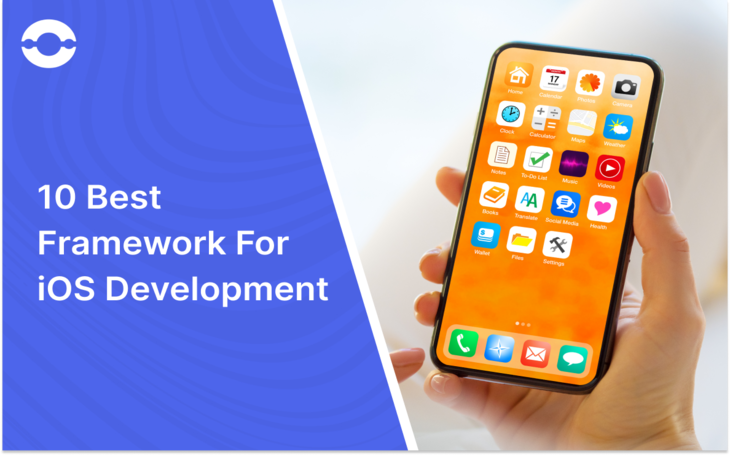
Mobile applications have become an integral part of human life. From the morning alarm to satisfying the mid-day snack cravings, to the late-night social media scrolling, our day starts, progresses, and ends with mobile apps. This is especially true for Apple users, as iOS apps add tremendous value to their lives and hence, iOS apps, despite mostly being paid, are a hit amongst users. Therefore, when so many users rely on these apps, developers and businesses need to ensure that the best framework for iOS development is used to build the most reliable and practical apps.
To make their research and work easier, we list down the best iOS development frameworks in this blog that would facilitate the development of robust iOS apps.
What are iOS frameworks?
iOS apps are growing in popularity and data studies report that app store is the hub of 2 million iOS apps. Such a number is expected to rise in the coming years.
But do you wonder how developers create successful applications?
That’s through the framework. Consider frameworks as the building blocks or the skeleton that sets the foundation for building high-quality iOS apps.
iOS app development frameworks combine the set of rules, regulations, guidelines, and tools that guide the developers on what structure they need to follow while creating an app.
Developers can save extra time and effort in writing code from scratch as the framework contains a library of prewritten code. Out of the frameworks listed below, Swift is considered the most popular framework in developing iOS apps.
10 Best Frameworks for iOS Development
For the development of iOS apps that make user’s life simpler and more vibrant, the business needs to have a clear vision for the product and should be on the same page with the development team on that.
Any utility-generating iOS app is developed using a software development framework or iOS app development framework. This framework for iOS development includes multiple supporting components or elements such as toolkits, several code libraries, debuggers, and a few interfaces.
Framework for iOS development supports and speeds up the process of iOS app development. Let’s look at some of the best frameworks for iOS app development.
The best iOS app development frameworks are as follows:
1. Ionic
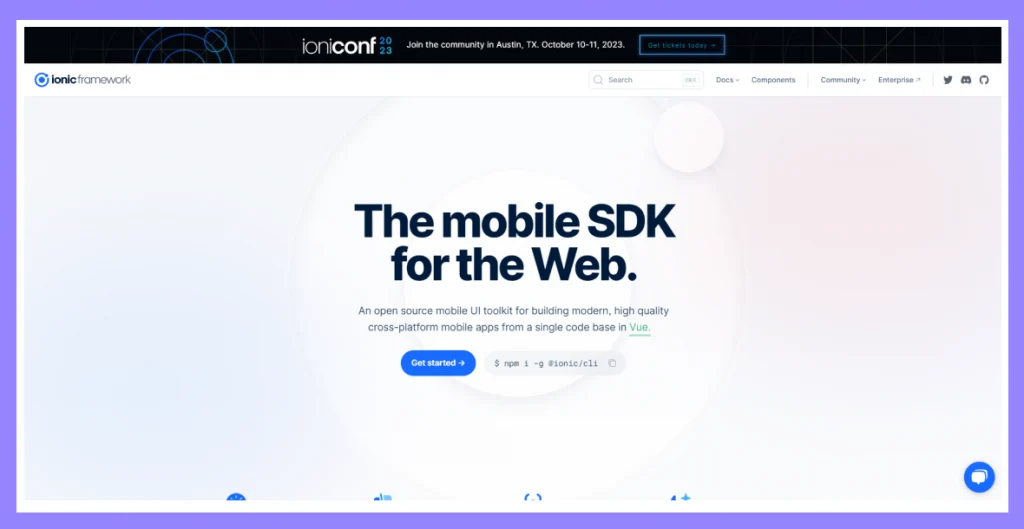
This is an Angular and Apache Cordova – based HTML5 open-source, iOS app development framework. It allows developers to develop apps for multiple platforms besides iOS, such as Android and Windows. Furthermore, Ionic also facilitates the development of cross-platform mobile apps.
Ionic empowers iOS developers with the choice to employ multiple UI components such as filters, forms, tab bars, list views, intuitive navigation menus, etc., directly into the app design, making it one of the top choices for the iOS app development framework. Moreover, it also offers a modified API that can be easily distributed.
Ionic is easy to use in comparison to other frameworks for iOS development for a developer well-versed in CSS, JavaScript, or HTML.
Some features of Ionic are:
- Facilitates quicker development with complete control over the app
- In-built intuitive UI components
2. Adobe PhoneGap iOS Development Framework
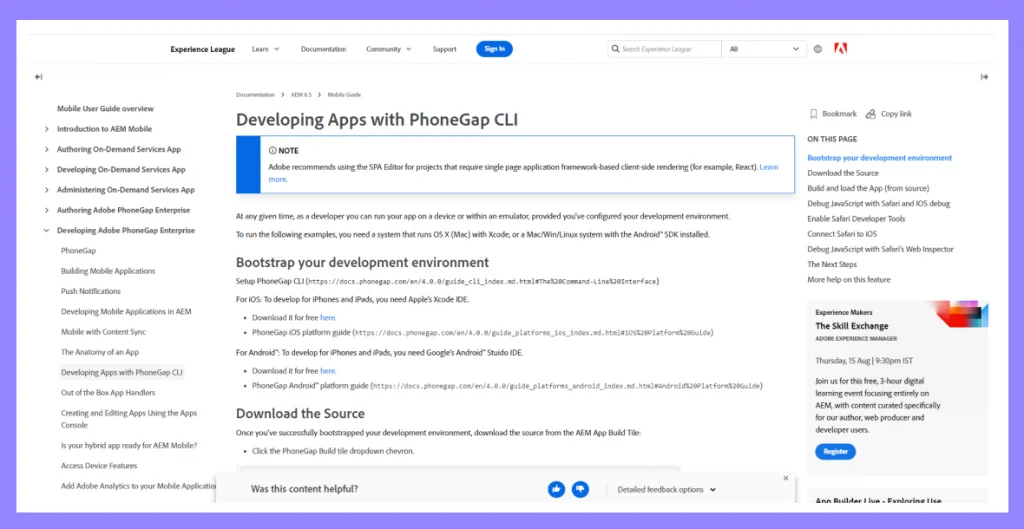
This framework for iOS development is widely used and delivers well-functioning iOS apps. Purchased by Adobe in 2011, PhoneGap allows the development of cross-platform apps using HTML5, CSS3, and JavaScript. It allows developers to build apps for Blackberry, Android, Windows, Mac OS, and Firefox OS even if they only have used the iOS framework architecture.
Adobe PhoneGap is an open-source framework that is highly collaborative, allowing multiple developers to come together on a single project. It further has a technology called Hydration. This technology reduces the time required to finish a program whilst also making the last update procedure simpler.
Some features of Adobe PhoneGap are:
- A flexible iOS development framework
- Allows code re-usability
- Open-source framework
- Does not come with any hardware restrictions
- Roust backend support
- Plugin Library & Third-Party tools
3. Sencha Ext JS – iOS Development Framework
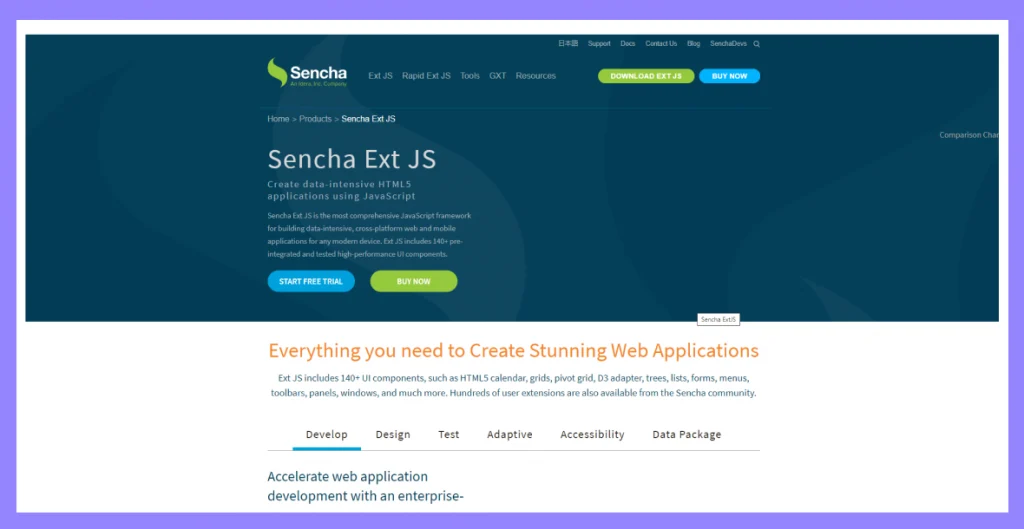
iOS app demands a flexible framework for iOS development. This is exactly where Sencha Ext JS comes in handy. Formerly known as Sencha, this framework was renamed after it collaborated with Ext JS, and allows developers to build multiple simpler as well as complex apps through the support provided for HTML 5 and JavaScript.
This framework comes with a wide range of widgets, including menus and lists, toolbars, etc., among other features, offering a lot more than its contemporaries. In fact, it also has a product called Sencha Test, that assists developers in testing apps across multiple platforms and browsers.
The ability of ExtJS to seamlessly integrate with other APIs helps developers to combine multiple APIs with a specific vision for the optimization of resources and the product. Furthermore, this iOS app development framework facilitates the development of data-intensive iOS apps.
It has 1000+ user extensions and comes with multiple components such as pivot and other grids, HTML5 calendar, D3 adaptor, trees, forms, lists, menus, windows, panels, etc.
Some features of Sencha Ext JS are as follows:
- Organization of large amounts of data
- Offers strong analytics
- Flexible layout structure
- Data visualization
- Package for Advanced Data-Driven Documents (D3)
4. Xamarin
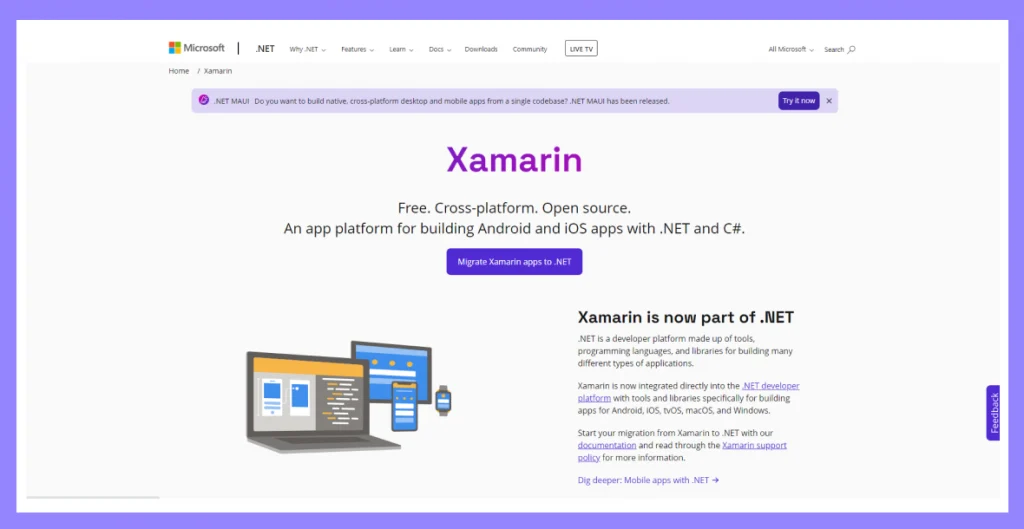
This is a name that all iOS developers are extremely familiar with. Supported by C# programming language, this framework reduces the development time through code recycling and compatible syntaxes.
An open-source platform, Xamarin offers provides a development environment with a strong backend, multiple components, APIs, etc. Native iOS apps could be developed easily using this framework.
Xamarin enjoys a large community support of more than 60,000 contributors.
Some features of Xamarin are:
- Native multi-platform support
- Versatile backend architecture
- Single code reusability
- Application/program loader
- Manager for Google emulator
5. Framework7
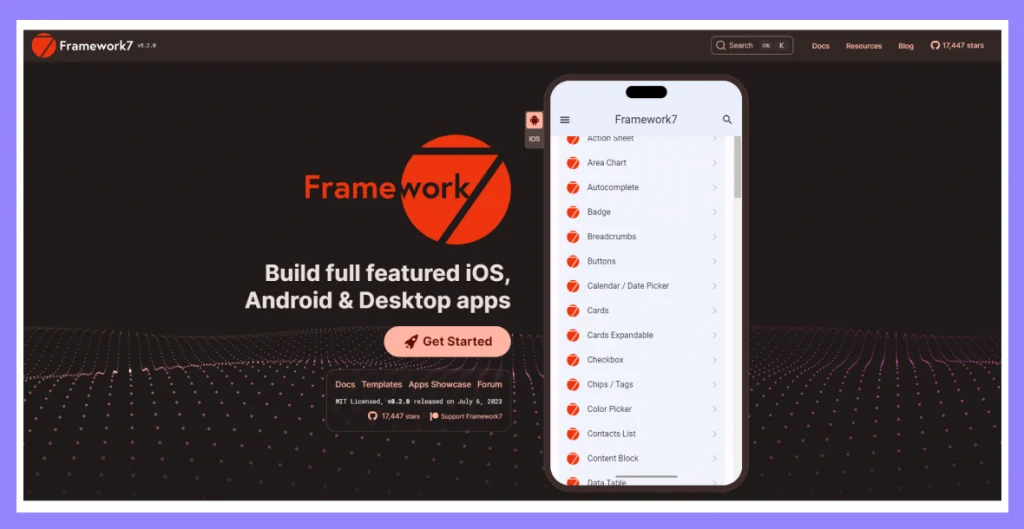
This is an open-source framework for iOS development. It is easy to use and facilitates the development of reliable apps using HTML, CSS, & JavaScript. It further offers additional support for Vue.js and React components for iOS app development.
Framework7 offers a wide variety of UI components and widgets such as action sheets, side panels, pop-ups, layout grids, form elements, etc.
Some features of Framework7 are:
- Allows customization
- Offers multiple UI widgets and elements
- Support of additional tools such as Electron & NW.js
6. React Native iOS App Development
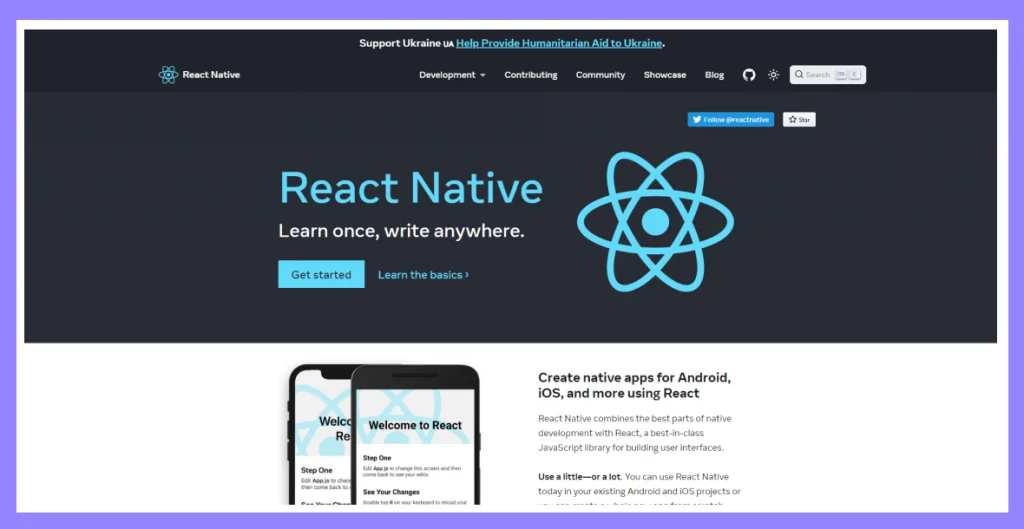
One of the best iOS app development frameworks, React Native is among the most popular JavaScript library and is chosen for its capabilities to create native apps for multiple platforms and devices. This framework facilitates quicker deployment times and positive ROI.
This framework is known for offering simple animations facilitated through speedy conversion of the code into native representations prior to execution. In addition, this framework allows developers to create platform-specific variations of multiple components. This makes it easier to use one codebase across various platforms.
React Native app development is an easy-to-learn and adopt framework.
Some of the React Native features include:
- Supports third-party libraries and plugins
- UI focused framework
- Low code
7. Flutter iOS Development
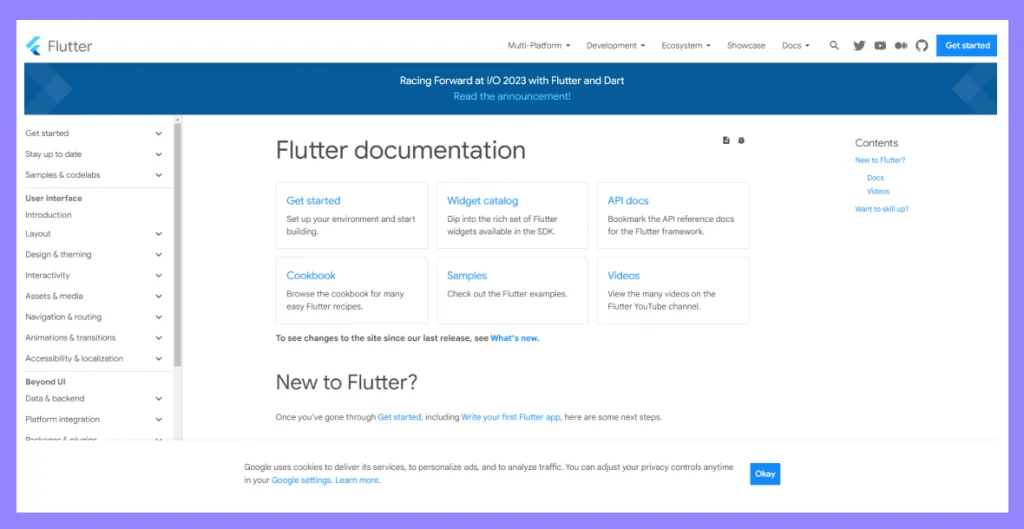
Created by Google, Flutter is an open-source iOS development framework. It is a UI toolkit that is used to develop native apps, desktops, and web platforms. It offers a wide variety of fully configurable widgets. These widgets allow developers to develop native iOS apps in a shorter span using quicker coding procedures. that helps to build native applications in a shorter span.
Flutter app development further comes with Skia, a 2D rendering engine for the development of the visual architecture of the iOS app. It also makes sure that components work efficiently.
Some features of Flutter are:
- Integrated material design and Cupertino (iOS-style) widgets
- Offers motion-rich APIs
- Dependable and strong widget support
8. Swift
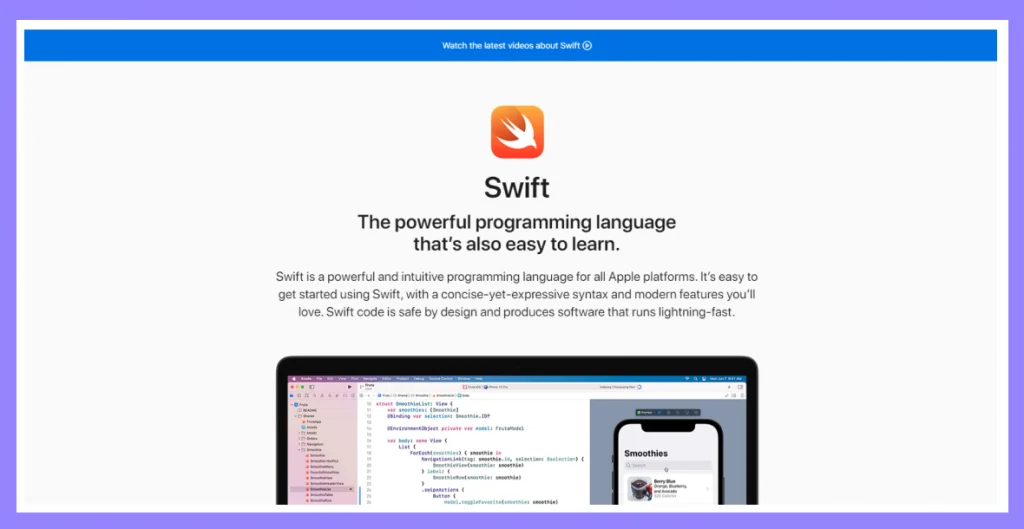
Among the most popular framework for iOS development is Swift. With a user-friendly user interface, this framework allows developers to incorporate the latest content on the internet rather than doing the labor from scratch. This streamlines the iOS development process.
Some features of Swift are:
- Seamless third-party integrations
- Offers ease of interaction and navigation
- Comes with a 30-day money-back guarantee
9. JQuery Mobile
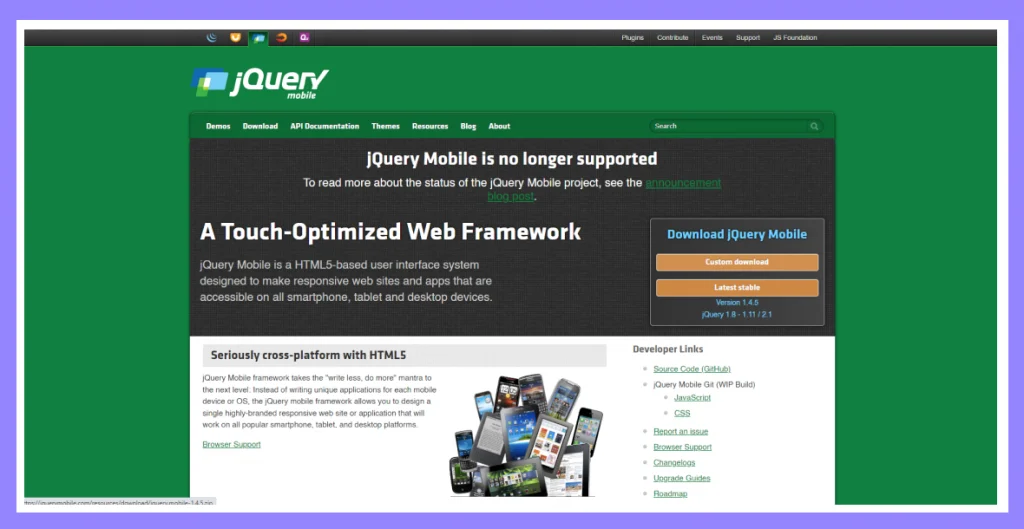
It is a cross-platform iOS development framework that allows running a single code across multiple devices. JQuery Mobile is an HTML 5-based development framework that has multiple plugins, pop-up boxes, content-slider, etc.
This framework further helps to create responsive Mac, iPad, and iOS applications. It is also compatible with other iOS app development frameworks such as PhoneGap.
Some features of JQuery Mobile are:
- It is a lightweight framework
- It is configured with HTML5
- Offers multiple plugin add-ons
- Allows automatic initialization
- It is a powerful theming framework
- Simple API
10. Native Scripts
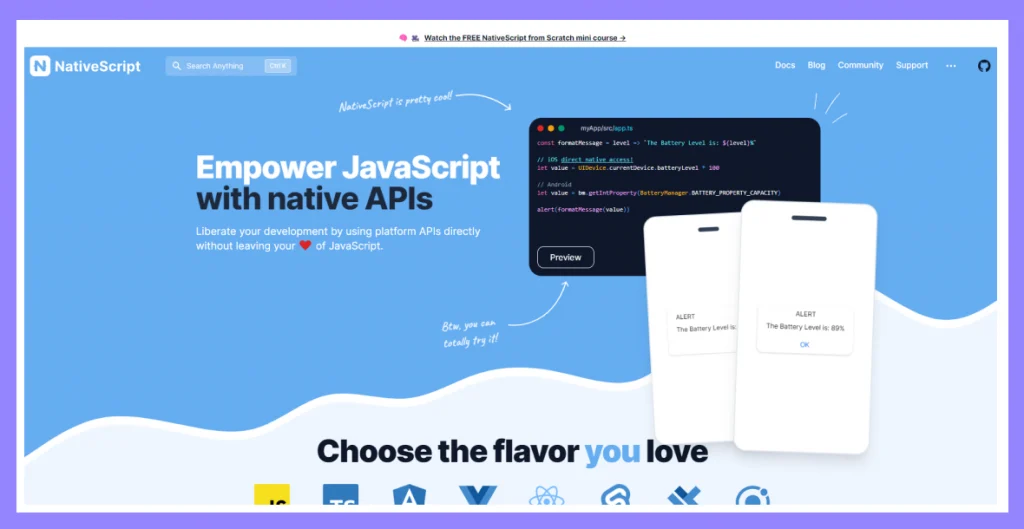
This is an open-source framework for iOS development that uses Angular, Vue.js, TypeScript, or JavaScript to build reliable native apps, from one codebase.
The apps built using Native Scripts have access to numerous native or phone features of the user, such as GPS, contacts, and camera.
Some features of Native Scripts are:
- Facilitates cross-platform app development
- Allows code-reusability
- Easy to learn and use the framework
- Strong backend and mission-critical support
Conclusion
This was the list of some of the best frameworks for iOS development that are the budling force or driving tools behind creative, reliable, and practical iOS apps.
Using these frameworks, developers accelerate the iOS app development process whilst ensuring a robust architecture, an easy-to-navigate UI/UX design, and high quality. They further simplify the development process and allow developers to innovate at scale, leveraging all the iOS trends and techniques that have taken over the tech world.
The choice of these frameworks should be made keeping the iOS project requirements and scale in mind.
We at BigOhTech use the most suitable iOS development framework to help our clients serve their Apple audience well. Our dedicated development team builds the most innovative yet practical iOS apps.
So, get in touch with us today to develop the most revenue-generating iOS apps!




